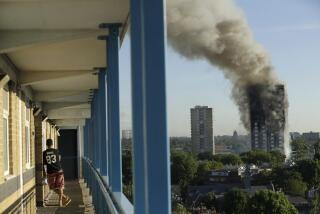Tears, Tough Questions on 9/11
- Share via
NEW YORK — Members of the commission investigating the Sept. 11 terrorist attacks said Tuesday that communications failures, faulty 911 instructions and rivalries between the city’s police and fire departments hampered rescue efforts at the World Trade Center.
During an emotional hearing attended by scores of victims’ family members, some commissioners expressed fear that New York City might not be adequately prepared for further attacks.
“We know they are coming,” said panel member John F. Lehman, who was Navy secretary under President Reagan. “New York is at the top of the priority list. We are in the crosshairs here.”
Commissioner Bob Kerrey, a former Nebraska senator, pressed Police Commissioner Raymond W. Kelly about whether the city’s hospitals could handle 10,000 casualties. “I would say no,” Kelly replied.
Panel members -- meeting 1 1/2 miles from ground zero -- praised the courage of the first responders who helped rescue 25,000 people after the two hijacked planes slammed into the trade center’s twin 110-story towers, collapsing them.
But the tone of the hearing Tuesday, during which key past and current New York City officials testified, was at times combative.
Lehman said communications and command-and-control problems between the police and fire departments during the attack were scandalous. “It’s not worthy of the Boy Scouts, let alone this great city,” he said.
“I couldn’t disagree with you more strongly,” countered former Fire Commissioner Thomas Von Essen, who was on the job during the attack that killed 2,752 people, including 343 firefighters. “I think it’s outrageous that you make a statement like that.”
Victims’ relatives applauded the panel members’ tough questions. Some wept when they viewed videotape of the towers collapsing. As Von Essen testified, Sally Regenhard, who lost her firefighter son, held up a sign that read “Lies.”
The hearing began with a commission report outlining problems with New York’s emergency response efforts. It detailed how officials were forced to make decisions based on incomplete communications, leading to some of the deaths in the towers.
The report said that although the Port Authority of New York and New Jersey, which operated the World Trade Center, had anticipated a possible chemical or biological attack on the complex, it had not considered the possibility that planes could be used as weapons.
In addition, there was no specific plan for evacuating one tower in the event of a catastrophe in the other. But even if there had been, the communications problems that day probably would have made such an operation impossible.
The report said that 911 operators and Fire Department dispatchers, lacking information about the location and amount of damage after the first plane struck the north tower, were unable to inform frantic callers whether they were above or below the fire. They told people to remain in place.
Emergency officials judged that the tower should be evacuated, but the public address system was damaged. At one point, announcements were made over the public address system in the south tower urging people to stay in place or, if they had already left, to return to their offices.
The pilots of police helicopters, which were circling both towers, said rooftop rescues would have been impossible because of smoke and turbulence caused by the heat from the fires. The pilots made their reports over police radio frequencies, and the information did not reach fire department commanders at the scene.
The commission’s preliminary findings said that none of the police or fire chiefs believed that collapse of either tower was possible, and that the consensus was to let the blazes burn themselves out.
“People watching on TV certainly had more knowledge of what was happening a hundred floors above us than we did in the lobby,” Peter Hayden, assistant chief of the Fire Department, told the committee’s investigators in a taped interview that was shown during the hearing.
Commission staff members, who conducted hundreds of interviews, also found that there was a long-standing rivalry between the police and fire departments -- including fistfights at the scene of previous emergencies. Some witnesses told the staff that the problem had escalated to the point where it interfered with the ability of the city to respond to disasters.
Despite all the official shortcomings, the former director of the World Trade Center, Alan Reiss, said the most anger should be reserved for the “19 people in an airplane,” referring to the hijackers.
Former Mayor Rudolph W. Giuliani and current Mayor Michael R. Bloomberg are scheduled to testify before the commission today. The 10-member, bipartisan panel has been holding hearings over the last year, including meetings last month in Washington, to examine what led to the attacks and to determine ways to avoid future ones. The panel is to issue its final report in July.
More to Read
Sign up for Essential California
The most important California stories and recommendations in your inbox every morning.
You may occasionally receive promotional content from the Los Angeles Times.













